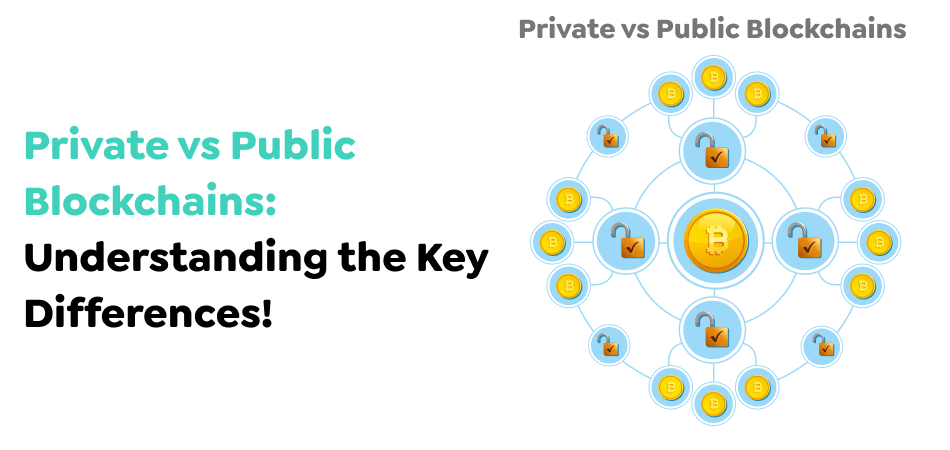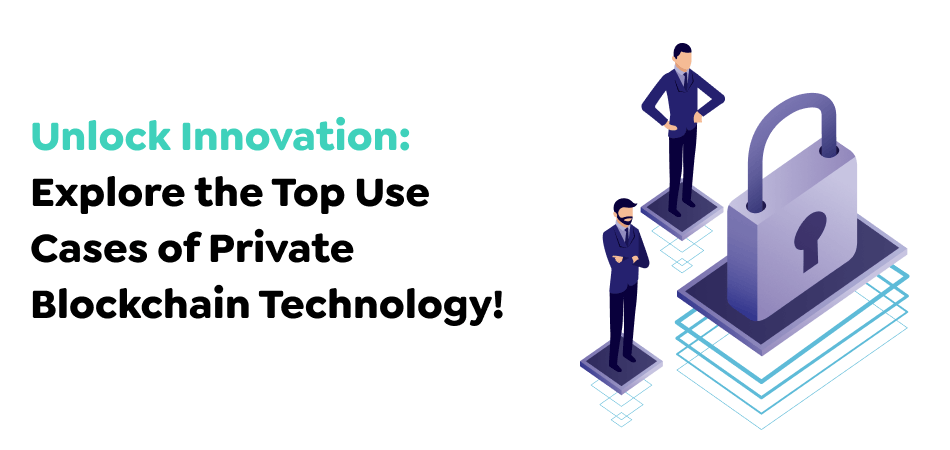16 Dec 2024
A Comprehensive Guide to Private Blockchain Development in 2025
Matthew Connor

In recent years, blockchain technology has gained traction as a robust solution for enhancing security across various sectors. Industries ranging from finance—where blockchain helps prevent fraud and streamline operations—to supply chain management, which benefits from enhanced transparency and traceability—are increasingly leveraging blockchain to secure data and improve processes.
Blockchain functions as a distributed database where most transactions occur across different computers. It does not allow any change once stored unless the entire network agrees to change it. This aspect significantly minimizes the risk of data tampering and enhances stakeholders ‘confidence. While Bitcoin and Ethereum are open blockchains that allow digital currency and decentralized applications, most organizations require private blockchain development for sensitive data. Private blockchain development enables better control, so organizations can have access but still utilize blockchain’s advantage of decentralization and data transparency—another important issue seen as effectively handled by blockchain.
Now, let’s explore the intricacies of private blockchains, uncovering their unique features, benefits, and real-world applications that set them apart from their public counterparts.
Understanding Private Blockchains

A private blockchain is similar to a public blockchain, which is a digital ledger technology but with the capability to grant network access to only specific people or establishments. Unlike a public blockchain, which everyone can join, a private blockchain can be limited only by some people.
Private blockchain provides that the network’s infrastructure is owned and operated by some nodes, while in public implementation, infrastructure is distributed across several computers. This setup offers greater control over data privacy and access.
Like the buyers of public blockchains, private blockchains also use consensus mechanisms to ensure the transaction’s legitimacy and security. Nevertheless, where fewer nodes participate in verification, the speed and efficiency of the transaction tend to be higher.
Let’s discover the key differences between private and public blockchain networks and how each serves unique purposes in the evolving digital landscape.
Also Read : Transforming Industries: The Significance of Blockchain App Development
Key Differences Between Private and Public Blockchain Networks

1. Network Access:
Public blockchains are available to everyone, ensuring that anyone can engage and that all the processes are clear. On the other hand, private blockchains are closed systems accessible only to particular, approved individuals for managed administrative data.
2. Control:
Management in public blockchains is also decentralized because all the participants share equal rights in the transactions. Private blockchains, however, operate with centralized control, managed by a select group of nodes for greater oversight.
3. Transaction Visibility:
Payments and other transactions in public blockchains are open to all network members. Private blockchains can limit access, allowing only pre-approved participants to access data containing the transactions.
4. Consensus Process:
In Public blockchains, several nodes participate in consensus, which slows down transactions. Fewer nodes in private blockchains make transaction processing faster and more efficient.
5. Security:
Public blockchains provide high security due to their wide decentralization, whereas private blockchains delegate the security issue to trusted centralized nodes, which is appropriate for a private enterprise setting.
6. Common Use Cases:
Public blockchains are more known for cryptocurrencies and Open Data but are widely used for decentralized applications. Private blockchains are most suitable for business applications where data needs to be kept secure.
Moving forward, the blockchain market is poised for substantial growth, driven by increasing demand for transparency, security, and efficiency across various industries.
Also Read : How Much Does It Cost to Hire Software Developers: A Comprehensive Guide
Blockchain Market Overview
1. Rising Industry Integration:
With the increased adoption of advanced technologies, Blockchain adaptations are becoming central to several industries, including finance, healthcare, and logistic supplies, where organizations harness the potential of Blockchain for enhanced clarity and sufficient functionality.
2. Increased Investment:
The blockchain market is constantly high, with even more venture capital investments in blockchain startups and projects, indicating high confidence in the field’s growth and future opportunities.
3. Evolving Regulatory Frameworks:
As blockchain adoption expands, governments worldwide are crafting regulatory frameworks, which could either encourage or restrict growth depending on regional policies and industry compliance.
4. Growth of Decentralized Finance (DeFi):
Decentralized finance application platforms are changing traditional financial services by delivering access to loans, savings, and insurance without requiring mediators, thereby democratizing financial opportunities.
5. Interoperability Limitations:
Institutions using distributed ledgers face challenges in interconnecting their networks, which shows the demand for products that help the integration of multiple blockchain systems.
6. Environmental Impact:
Blockchain’s energy demands, especially with proof-of-work algorithms, have raised environmental concerns, spurring initiatives toward sustainable practices and the development of eco-friendlier alternatives.
7. Skilled Workforce Gap:
There is a general shortage of proficient blockchain personnel, which has resulted in a corresponding emphasis on entrepreneurship and learning to produce potential blockchain staff.
Also Read : Revolutionizing Fintech: The Role of React Native App Development
Establishing a Private Blockchain Network

In private blockchain development, the network is set up by selecting participants, or nodes, that will have access to the network. Unlike public blockchains, access is restricted to specific organizations, allowing for more centralized control over network governance and ensuring data privacy. This setup is ideal for businesses that require secure, private data sharing within their internal ecosystem.
1. Setting Up Nodes
After identifying the participants, nodes are placed in a safe, separate environment on-premise servers or even cloud solutions. These nodes are designed to maintain the ledger, check transactions, and, therefore, support the proper functioning of a blockchain. With private blockchain development, organizations can maintain control over node deployment, enhancing system reliability and privacy.
2. Starting Transactions
In a private blockchain, financial transactions, for example, can be made only by those participants who were granted access. This strict transaction initiation process is an important component of a private blockchain, provides a secure system for information, and keeps records confidential from the outward-facing network.
3. Consensus and Validation
Private blockchain networks use various consensus mechanisms, such as proof-of-work or proof-of-stake, to validate transactions and achieve network agreement. In the case of private blockchains, consensus algorithm is designed according to the organization’s requirements of which enhances scalability and organizational influence of the network validation process.
4. Forming Blocks
The validated fittings are then compiled into blocks that form the blockchain, which stores the transactions. This block creation can only be done by the authorized nodes in the private blockchain, and the process is very secure. This limited participation in formulating the blockchains in private blockchains helps reduce risks and ensure accuracy by prescribing who could add other blocks.
5. Updating the Blockchain
As new blocks are created, subsequently, the blockchain ledger is updated to reflect the latest transactions, data ownership changes, and network rules. Moreover, private blockchain development enables these updates with strict privacy protocols, thereby ensuring the network’s data is accessible only to trusted parties. This, in turn, enhances security and organizational trust.
Moving forward, developing a private blockchain offers key advantages, so let’s explore them.
Also Read : Stay Ahead of the Curve: 8 Effective Ways to Protect Your Fintech App
Key Advantages of Developing a Private Blockchain

1. Controlled Network Access
Private blockchain networks give organizations full control over who can join and interact within the network. This restricted access is invaluable for industries handling sensitive data, like healthcare and finance, where strict data security is paramount. By limiting participation to authorized entities, private blockchains significantly reduce security risks. Moreover, they help maintain regulatory compliance and promote efficient data sharing among trusted parties, creating a secure environment for collaboration.
2. Enhanced Transparency for Stakeholders
Though access is restricted, private blockchains offer transparency within the network by securely recording and storing each transaction in a decentralized ledger. This transparency prevents any single party from altering the data, fostering trust among participants. As all parties have visibility into the same, consistent information, this transparency enhances accountability and encourages open, reliable collaboration.
3. Customization and Scalability
Private blockchain solutions are intended to be very flexible as the structure will be tailored to the business needs of various companies. This consists of the capability to accommodate a higher volume of transactions if the need arises without necessarily detrimenting its performance. While public blockchains may have limits by design that require utilizing third-party services or any other means to add more blocks and, hence, more transactions to the chain, private blockchains are naturally well-equipped to support efficient, high throughput scenarios desirable for existing organizations with special needs.
4. Advanced Data Privacy and Security
In sectors such as finance or healthcare, whose data is sensitive, private blockchain development ensures data privacy by encrypting and controlling access to data. By restricting data visibility and applying stringent privacy protocols, private blockchain development ensures that only authorized individuals can access sensitive information, protecting it from breaches and unauthorized access. Due to the emphasis put on privacy, private blockchains are appropriate for processing confidential information.
5. Empowering Enterprise Innovation
Private blockchains offer a secure, controlled space where enterprises can explore blockchain technology and test innovative use cases without exposing sensitive information to public networks. The secure environment also promotes collaboration between companies, allowing them to exchange data and resources within a trusted network. The use of the virtual platform also assures various companies that they can share information and resources in a secure network that cannot be altered easily. This controlled yet flexible setting helps enterprises as they adopt blockchain for value creation and operational efficiency.
Essential Features of a Powerful Private Blockchain

Private blockchain development provides a secure and efficient platform for safeguarding critical business data. Moreover, to harness the full potential of this technology, it’s crucial to understand the standout features that drive success. Therefore, below are ten must-have elements for a robust private blockchain that can effectively support business objectives.
1. High Performance
Private blockchains are specifically designed for optimal efficiency, as a result offering high scalability and rapid transaction speeds. Consequently, this allows businesses to manage substantial transaction volumes seamlessly, while also minimizing delays and maintaining smooth operations even as demands increase.
2. Scalable Architecture
Scalability is fundamental to accommodate growth in both users and transactions without sacrificing performance. Techniques like sharding, sidechains, and parallel processing enable private blockchains to scale effectively, supporting businesses as they expand.
3. Centralized Oversight
Unlike public blockchains, private blockchain systems permit centralized governance. Designated authorities can manage and regulate the network, giving businesses enhanced control over security, user access, and protocol management.
4. Accelerated Transaction Speed
Customized consensus mechanisms in private blockchains streamline transaction processing, enabling real-time operations without bottlenecks. This is particularly beneficial for enterprises needing fast, efficient transaction handling.
5. Smart Contract Integration
Private blockchains support smart contracts, allowing for automated, self-executing agreements directly coded into the blockchain. This eliminates the need for intermediaries, enhancing security and efficiency while simplifying contract management.
6. Seamless Integration
While private blockchains work seamlessly with current enterprise architectures, many can be implemented into existing enterprise processes without any complex changes to the system currently in place. This characteristic enables businesses to adopt the technology with less change in their functioning.
7. Compliance Management
Permissioned and controlled systems offer the startup flexibility desired by many industries today to circumvent reported and proposed regulations. This feature proves rather useful and is especially appropriate for businesses operating in the finance and healthcare niches.
8. Advanced Data Governance
In a private blockchain, the end business entity fully manages the data. Moreover, this governance framework ensures that only authorized users can access sensitive information, thereby safeguarding privacy and reinforcing data security.
9. Enhanced Privacy and Confidentiality
Private blockchains can maintain data privacy by using keys and limiting access to the information. These steps do not allow intruders to make changes while keeping records of such changes, complying with both openness and secrecy principles.
10. Cross-Chain Communication
Interoperability’s main application is that the private blockchain can communicate with other networks, whether they are public or private ones. Furthermore, it enhances coordination in sharing such data, thereby creating a web of trust that ultimately allows the sharing of such information across industries.
Also Read : How AI is going to transform Fintech in Canada
Estimating the Investment for Private Blockchain Development
Private Blockchain Development involves various elements that influence the overall cost. Key factors such as the project’s complexity, the chosen technology stack, and the proficiency of the development team all play a role in determining the financial commitment. Generally, simpler private blockchain solutions require a moderate investment, while projects with enhanced features, intricate security protocols, and customized functionalities may demand a substantially higher budget. Understanding these cost drivers assists businesses in planning for blockchain solutions that meet their needs and objectives.
Features of a Private Blockchain Framework
Building a private blockchain requires careful attention to several foundational elements that define its security, functionality, and operational integrity. Key components include:
1. Consensus Mechanism:
A consensus mechanism therefore can be used to resolve the problem of transaction validation and approval in a private blockchain network. For instance, traditional consensus algorithms like Proof-of-Authority (PoA) and Practical Byzantine Fault Tolerance (PBFT) furthermore guarantee the reliability and efficiency of obtaining consensus across the network.
2. Integrated Wallet System:
To directly address the issues of payment and security on the blockchain, moreover, an integrated wallet must provide the necessary services for handling digital assets securely as well as for managing such transactions across the blockchain. In addition, it can be used to store, transfer, and receive tokens securely, thereby improving the network’s capabilities.
3. Data Encryption and Hashing:
Encryption and hashing are two of the foremost functions of blockchains, as they work together to safeguard information in its surroundings. Specifically, they help to shield such information, thereby avoiding transaction compromises by making it both defensive and immune to alteration by unauthorized parties.
4. Governance Protocols:
Rules and regulation procedures in the network clearly determine the existing set of guidelines, thereby defining the decision-making environment. As a result, this renders a transparent environment and effectively dissipates conformity issues, ultimately impacting the reliability of the participants.
5. Transaction Authentication:
Transaction authentication is critical to ensure each transaction is authentic before it becomes a permanent record on the blockchain. It protects the network from fraudulent, fake, or unauthorized activities since only authorized transactions are accepted in the network.
Also Read : How To Develop A Successful Wealth Management App
Top Use Cases of Private Blockchain Technology

In the digital age, private blockchain technology has undoubtedly proven to be an effective tool for businesses looking to enhance security, streamline operations, and manage data confidentially. To begin with, here are five prominent ways it’s utilized across different sectors:
1. Healthcare Data Security:
Private blockchains are being deployed in the healthcare sector as value-added service enablers to handle and exchange patients’ data among caregivers safely. This approach helps increase data credibility and efficiency of actions that take place while preserving the patients’ confidentiality and advancing the integration of care without risking the patients’ right to privacy.
2. Real Estate Transactions:
The real estate industry also enjoys private blockchains, which help eliminate fraud by making transactions easier. A decentralized, shared ledger permits all parties to have the same version of the truth, thus reducing third-party intermediaries in property transactions.
3. Finance and Banking Solutions:
Financial institutions adopt private blockchains for sustainable and secure transactions, such as payments, money transactions across borders, trade finance, and asset management. This technology leads to efficient and effective transaction processes and decreases the company’s operational costs, helping this industry become more competitive.
4. Intellectual Property Management:
Governance protocols establish the framework of rules and processes for decision-making within the network. This technology safely establishes creators’ rights so they receive deserved wages while preserving and progressing IP utilities in a decentralized fashion.
5. Supply Chain Management:
Secure blockchains are becoming popular for managing and tracking inventory of products and goods through real-time data of the products and authenticating them. This results in more openness, less waste, and fewer cases of counterfeits and ultimately revolutionizes the performance of supply chains globally.
These examples highlight how private blockchain development is reshaping multiple industries. As it advances, the technology’s applications are expected to expand further, transforming processes in sectors ranging from government to retail and driving modern innovation.
How Techugo Can Support You In Private Blockchain App Development
Techugo’s team of seasoned blockchain developers brings specialized expertise in blockchain technology and its applications across various industries. Our professionals are adept at navigating the intricacies of blockchain development to help you make the most of this transformative technology. Techugo offers custom-built private blockchain solutions designed to cater to your specific business requirements. Whether you’re aiming to enhance security, improve data transparency, or streamline operations, we work closely with you to craft and implement a blockchain solution that drives both efficiency and innovation in your business. Partner with Techugo, a mobile app development company in Canada, to unlock the full potential of blockchain for your enterprise.
Conclusion
In conclusion, private blockchain development presents a unique opportunity for businesses to enhance security, improve operational efficiency, and maintain data privacy. By leveraging the tailored solutions offered by expert developers, organizations can navigate the complexities of blockchain technology while fostering trust and transparency among stakeholders. As industries increasingly recognize the value of private blockchains, partnering with skilled providers like Techugo can empower companies to harness the full potential of this transformative technology and drive innovation in their operations.
Get in touch with us today to learn how Techugo can help you build a secure, efficient, and scalable blockchain solution tailored to your needs.
Get In touch
We are excited to here from you and let’s start something special Together. Call Us for any inquiry.
Write us
sales@techugo.caJust a call away
About you




